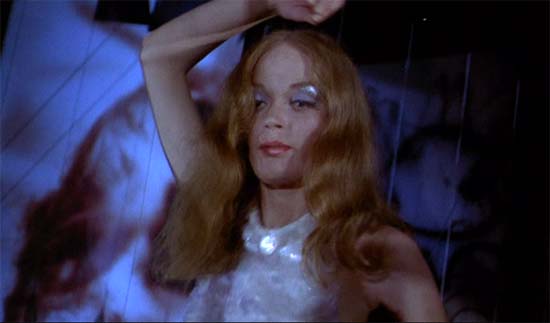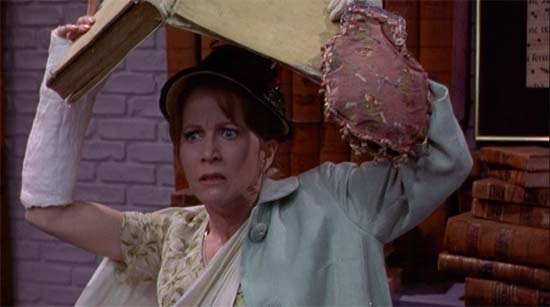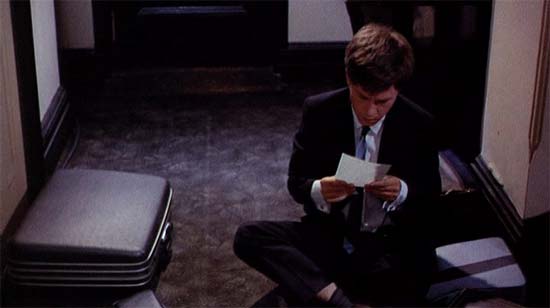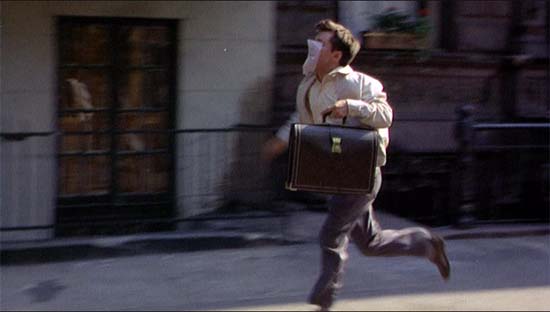 Francis Ford Coppola’s film school thesis, You’re a Big Boy Now, is also his first major picture (he’d directed Dementia 13 a few years before), and it’s appropriate that a coming-of-age comedy should also be a work of giddy experimentation and exploration, not to mention a blossoming of a major talent. It’s the story of Bernard Chanticleer (Peter Kastner), a terribly sheltered wallflower with a Walter Mitty-ish tendency to lose himself in digressive fantasies. These intensely subjective episodes give Coppola the chance to try out every single cinematic trick in the book, speeding up the film, adding comic mini-sketches that foreshadow Monty Python’s Flying Circus and the early comedies of Woody Allen, applying chapter-like intertitles, and, in one fantastic sequence, staging a kind of cinematic auto-erotic asphyxiation, as Bernard’s tie gets caught in a coin-operated peepshow, and he’s almost strangled to death while the stripper in the stag reel beckons him on, and the film warps, burns, and deteriorates. In just a few years Coppola would be creating masterpieces, but here, at the beginning, he’s already exploding the conventions, just to see what he can do.
Francis Ford Coppola’s film school thesis, You’re a Big Boy Now, is also his first major picture (he’d directed Dementia 13 a few years before), and it’s appropriate that a coming-of-age comedy should also be a work of giddy experimentation and exploration, not to mention a blossoming of a major talent. It’s the story of Bernard Chanticleer (Peter Kastner), a terribly sheltered wallflower with a Walter Mitty-ish tendency to lose himself in digressive fantasies. These intensely subjective episodes give Coppola the chance to try out every single cinematic trick in the book, speeding up the film, adding comic mini-sketches that foreshadow Monty Python’s Flying Circus and the early comedies of Woody Allen, applying chapter-like intertitles, and, in one fantastic sequence, staging a kind of cinematic auto-erotic asphyxiation, as Bernard’s tie gets caught in a coin-operated peepshow, and he’s almost strangled to death while the stripper in the stag reel beckons him on, and the film warps, burns, and deteriorates. In just a few years Coppola would be creating masterpieces, but here, at the beginning, he’s already exploding the conventions, just to see what he can do.
 Luckily, it all serves the story. Based upon a novel by David Benedictus, the story plays like The Graduate with all of its mellow siphoned out, and replaced with pixie stix sugar laced with LSD. Rather than Simon & Garfunkel, The Lovin’ Spoonful provide the soundtrack, memorably opening with the icy-beautiful, miniskirted Barbara Darling (Elizabeth Hartman) marching through the center aisle of a cathedral-like library while John Sebastian screams, “Girl, beautiful girl, I want to see your insides.” The buoyant jugband tendencies of the Spoonful typically didn’t allow for such seething, raw (and slightly creepy) sexuality, but Sebastian takes full advantage, reprising the song in a slightly more sinister vein in a later scene as Barbara Darling go-go dances in a cage below the awestruck gaze of Bernard, completely ignoring his kind-hearted date, Amy Partlett (Karen Black). Sebastian allows a window into Bernard’s savage side, his painfully emerging adult self, which is welcome, since for so much of the film we see the wide-eyed, utterly naive child he can’t yet leave behind. He’s coddled by his mother (Geraldine Page), and his wealthy father (Rip Torn) casts such a shadow that he’s only permitted to address him by the initials “I.H.” In one of the film’s funniest scenes, they brief him as he prepares to move out of the house and into the big city, piling on all the advice they can think of, while setting restriction after restriction upon his new life (don’t smoke, don’t talk to girls), footnoted that he shouldn’t forget to have fun. He moves into an apartment whose landlord becomes an unwelcome surrogate mother, Miss Thing (Julie Harris). Her late husband’s rooster still holds dominion over the upper landing, and is set to attack any attractive females who come to visit. So Bernard Chanticleer, rooster-guarded, has been prepared for a miserable and lonely life as his parents apparently intend. Things go awry immediately, largely because of his burgeoning interest in the opposite sex, and also because of the proudly negative influence in his life, his friend Raef (Tony Bill), who casually slips him uppers and downers in the guise of aspirin, and encourages him to deflower Amy as soon as possible. What Raef doesn’t suspect is that the untouchable Barbara Darling will take an interest in Bernard, of all people. Bernard’s subsequent sex education with the sophisticated but slightly unhinged Barbara, while Amy waits on the sidelines, becomes a very rough ride into adulthood and emotional maturity.
Luckily, it all serves the story. Based upon a novel by David Benedictus, the story plays like The Graduate with all of its mellow siphoned out, and replaced with pixie stix sugar laced with LSD. Rather than Simon & Garfunkel, The Lovin’ Spoonful provide the soundtrack, memorably opening with the icy-beautiful, miniskirted Barbara Darling (Elizabeth Hartman) marching through the center aisle of a cathedral-like library while John Sebastian screams, “Girl, beautiful girl, I want to see your insides.” The buoyant jugband tendencies of the Spoonful typically didn’t allow for such seething, raw (and slightly creepy) sexuality, but Sebastian takes full advantage, reprising the song in a slightly more sinister vein in a later scene as Barbara Darling go-go dances in a cage below the awestruck gaze of Bernard, completely ignoring his kind-hearted date, Amy Partlett (Karen Black). Sebastian allows a window into Bernard’s savage side, his painfully emerging adult self, which is welcome, since for so much of the film we see the wide-eyed, utterly naive child he can’t yet leave behind. He’s coddled by his mother (Geraldine Page), and his wealthy father (Rip Torn) casts such a shadow that he’s only permitted to address him by the initials “I.H.” In one of the film’s funniest scenes, they brief him as he prepares to move out of the house and into the big city, piling on all the advice they can think of, while setting restriction after restriction upon his new life (don’t smoke, don’t talk to girls), footnoted that he shouldn’t forget to have fun. He moves into an apartment whose landlord becomes an unwelcome surrogate mother, Miss Thing (Julie Harris). Her late husband’s rooster still holds dominion over the upper landing, and is set to attack any attractive females who come to visit. So Bernard Chanticleer, rooster-guarded, has been prepared for a miserable and lonely life as his parents apparently intend. Things go awry immediately, largely because of his burgeoning interest in the opposite sex, and also because of the proudly negative influence in his life, his friend Raef (Tony Bill), who casually slips him uppers and downers in the guise of aspirin, and encourages him to deflower Amy as soon as possible. What Raef doesn’t suspect is that the untouchable Barbara Darling will take an interest in Bernard, of all people. Bernard’s subsequent sex education with the sophisticated but slightly unhinged Barbara, while Amy waits on the sidelines, becomes a very rough ride into adulthood and emotional maturity.
 In retrospect, much of what makes You’re a Big Boy Now so unique is how it balances slapstick and satire with a scene or two of raw emotion, notably the moment when an impotent Bernard cries into his hands, “What’s wrong with me?” and Barbara responds, seething, “Nothing a firing squad couldn’t fix.” But the moment is prefaced by the most bittersweet in the film, as she leads Bernard to bed for the first time, begins an erotic dance for him, and then, on the cusp of foreplay, distractedly announces she’s going to sleep; Bernard, aroused and stunned, acquiesces a goodnight. The scene plays out over the full length of “Darling Be Home Soon” (one of Sebastian’s most touching songs), and as the song ends, the defeated Bernard asks if he should take the record off. “It turns off automatically,” she sleepily responds. It’s a beautiful, oddly heartbreaking scene, anticipating the darker turn their relationship will soon take.
In retrospect, much of what makes You’re a Big Boy Now so unique is how it balances slapstick and satire with a scene or two of raw emotion, notably the moment when an impotent Bernard cries into his hands, “What’s wrong with me?” and Barbara responds, seething, “Nothing a firing squad couldn’t fix.” But the moment is prefaced by the most bittersweet in the film, as she leads Bernard to bed for the first time, begins an erotic dance for him, and then, on the cusp of foreplay, distractedly announces she’s going to sleep; Bernard, aroused and stunned, acquiesces a goodnight. The scene plays out over the full length of “Darling Be Home Soon” (one of Sebastian’s most touching songs), and as the song ends, the defeated Bernard asks if he should take the record off. “It turns off automatically,” she sleepily responds. It’s a beautiful, oddly heartbreaking scene, anticipating the darker turn their relationship will soon take.
 Bizzarely, Barbara is, in some ways, an accommodating fit for Bernard. She, too, is prone to wild flights of the imagination, though they’re wrapped in narcissism: she dictates her improbable biography to her fellow actor (a dwarf who obviously nurses unrequited affection), including her wild love affair with her one-legged albino hypnotherapist. She also sees in Bernard an opportunity to mother him, and she treats him to milk and cookies; really, she’s the third mother figure for Bernard in the film, and just as suffocating as his biological mother and the lonely Miss Thing. But the relationship quickly becomes abusive, if not abusive/co-dependent, and it’s a relief when he finally escapes.
Bizzarely, Barbara is, in some ways, an accommodating fit for Bernard. She, too, is prone to wild flights of the imagination, though they’re wrapped in narcissism: she dictates her improbable biography to her fellow actor (a dwarf who obviously nurses unrequited affection), including her wild love affair with her one-legged albino hypnotherapist. She also sees in Bernard an opportunity to mother him, and she treats him to milk and cookies; really, she’s the third mother figure for Bernard in the film, and just as suffocating as his biological mother and the lonely Miss Thing. But the relationship quickly becomes abusive, if not abusive/co-dependent, and it’s a relief when he finally escapes.
 That sense of escape, of fought-over freedom, is the lifeblood of the narrative: first when Bernard chases a kite through the park until he discovers Barbara, sitting upon an Alice in Wonderland statue, looking the picture of beauty and wonder; then when he gets his first letter from Barbara, and jubilantly runs through the street to the strains of the title song (before the letter slips out of his grasp and into the gutter); and ultimately when he steals I.H.’s prized Guttenberg Bible and flees, leading in a chase a chaotic parade of the film’s characters and all the baggage, emotional and physical, that they carry with them. Coppola would soon apply his talents to grander subjects, but for a subversive, quick-witted coming-of-age tale, You’re a Big Boy Now easily ranks with the early works of Hal Ashby. After a long absence from home video, it’s finally available on DVD from the Warner Archives.
That sense of escape, of fought-over freedom, is the lifeblood of the narrative: first when Bernard chases a kite through the park until he discovers Barbara, sitting upon an Alice in Wonderland statue, looking the picture of beauty and wonder; then when he gets his first letter from Barbara, and jubilantly runs through the street to the strains of the title song (before the letter slips out of his grasp and into the gutter); and ultimately when he steals I.H.’s prized Guttenberg Bible and flees, leading in a chase a chaotic parade of the film’s characters and all the baggage, emotional and physical, that they carry with them. Coppola would soon apply his talents to grander subjects, but for a subversive, quick-witted coming-of-age tale, You’re a Big Boy Now easily ranks with the early works of Hal Ashby. After a long absence from home video, it’s finally available on DVD from the Warner Archives.









